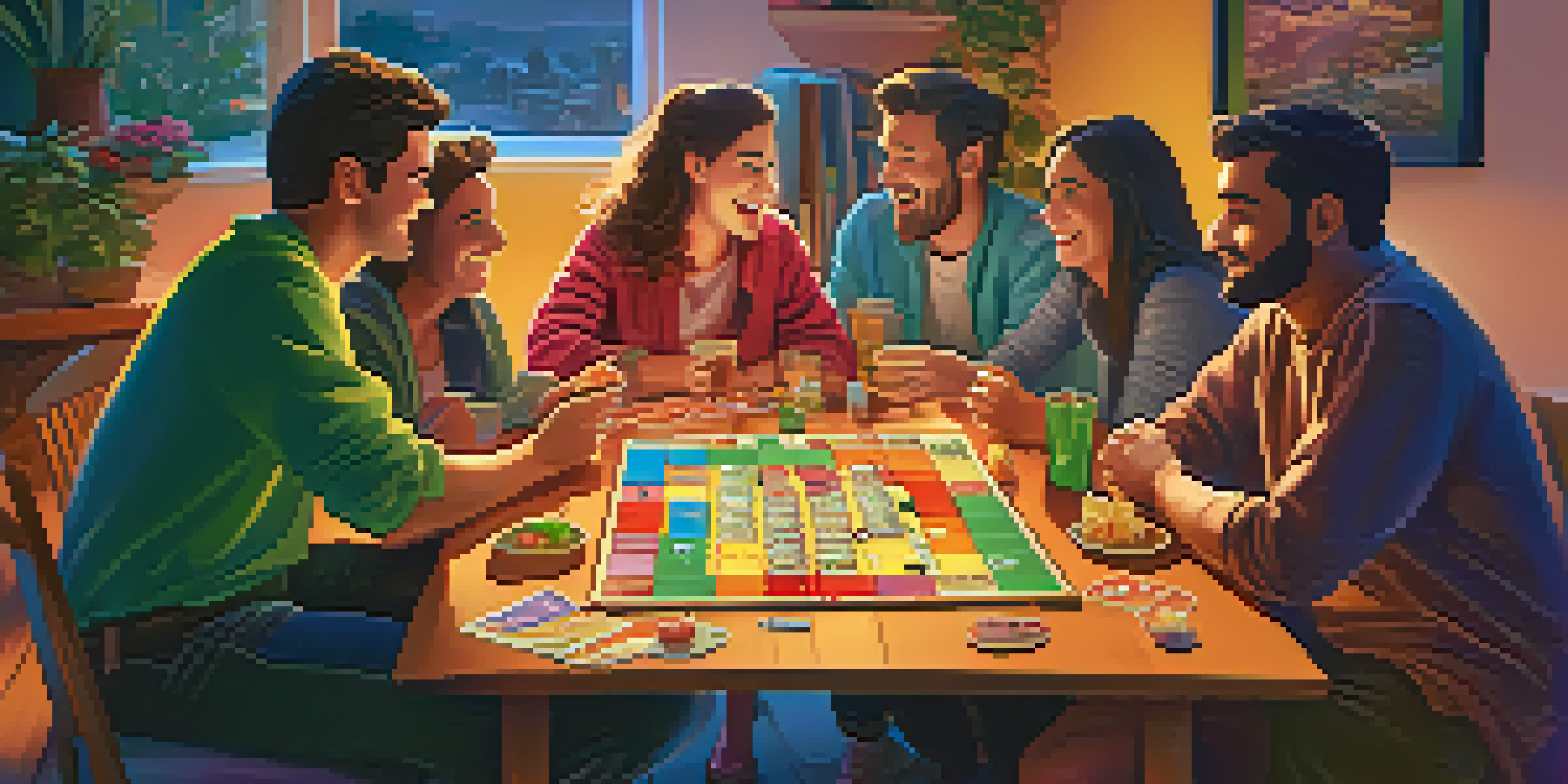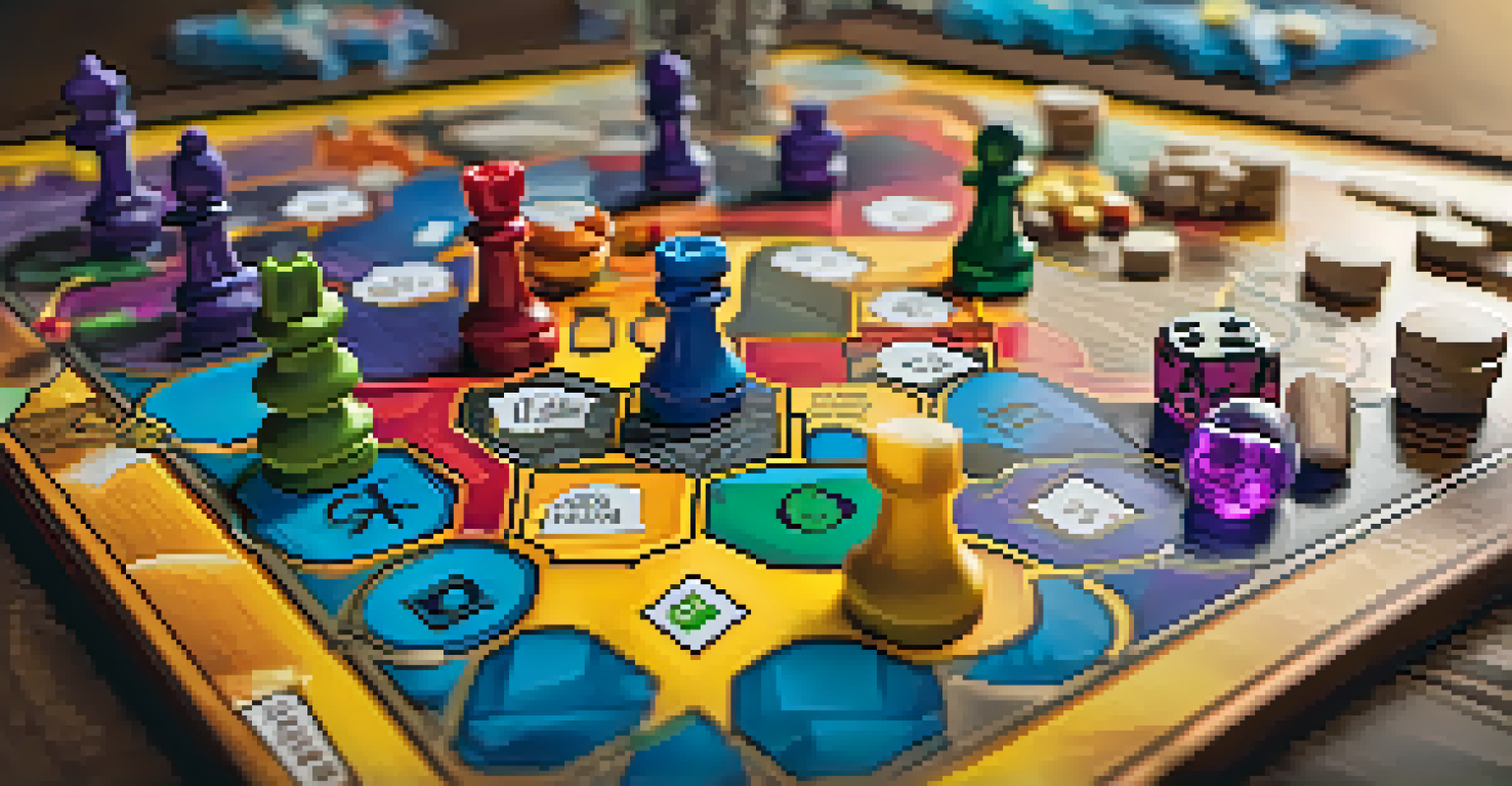How to Pick the Perfect Board Game for Your Group

Understand Your Group's Preferences and Dynamics
Before diving into the world of board games, take a moment to consider the preferences and dynamics of your group. Are they competitive, casual, or cooperative players? Understanding these traits can significantly influence your choice.
Games are a way to escape reality and connect with others.
For instance, if you're dealing with a competitive crowd, games like 'Catan' or 'Ticket to Ride' may spark their interest. On the other hand, groups that thrive on collaboration might enjoy titles like 'Pandemic' or 'Forbidden Island.'
Getting to know your group's personality can elevate the gaming experience. So, engage in a fun chat about past favorites and dislikes; it’s often a great way to gather insights!
Consider the Number of Players and Game Length
The number of players and the desired game length are crucial factors when selecting a board game. Some games work best with larger groups, while others shine with intimate gatherings. Knowing how many people will be playing can help narrow down the options.

For example, games like 'Dixit' are perfect for larger groups of 6-12 players, while '7 Wonders' works well with up to 7. Similarly, if your group is short on time, consider quick games like 'Exploding Kittens' instead of lengthy options like 'Twilight Imperium.'
Know Your Group's Dynamics
Understanding whether your group prefers competitive, casual, or cooperative games can greatly influence your selection.
Balancing player count and game duration ensures everyone stays engaged and has fun. A game that drags on or can't accommodate everyone can lead to frustration, so it's essential to plan accordingly.
Evaluate Complexity: Rules and Learning Curve
Every board game comes with its own complexity level, and it's essential to consider how comfortable your group is with learning new rules. Some players enjoy the challenge of intricate games, while others may prefer something more straightforward.
The best games are the ones that bring people together.
Take 'Chess,' for instance, which has simple rules but deep strategic layers, versus 'Monopoly,' which is easy to grasp but can become tedious. Think about your group's experience with games and pick accordingly to enhance their enjoyment.
Remember, the aim is to foster engagement and fun, not frustration. Opt for games that match their skill levels, and don’t hesitate to provide a brief tutorial to get everyone on the same page.
Theme and Aesthetics: Make It Visually Appealing
A game’s theme and aesthetic can significantly impact its appeal. Whether your group is into fantasy, strategy, or mystery, choosing a game that aligns with their interests can spark excitement and engagement.
For example, if your friends love adventure, games like 'Dungeons & Dragons' or 'Gloomhaven' may resonate well. On the flip side, if they enjoy lighter themes, consider humorous games like 'Codenames' or 'Sushi Go!'.
Consider Player Count and Time
The number of players and the desired game length are crucial factors that help narrow down your board game options.
Visually appealing games with captivating artwork can also enhance the overall experience. A well-designed box and components will draw players in and set the mood for an enjoyable gaming session.
Check for Replayability: Avoiding One-Time Wonders
Replayability is a key factor in selecting a board game. You want a game that can provide new experiences or challenges each time it’s played, ensuring it remains fresh and exciting for your group.
For instance, games like 'Carcassonne' or 'Terraforming Mars' offer various strategies and outcomes, making them enjoyable over multiple sessions. In contrast, games with a linear storyline or limited choices may only captivate players once.
By choosing games with high replay value, you can keep your group entertained for longer. This not only saves you from hunting for new games constantly but also builds lasting memories around shared experiences.
Read Reviews and Get Recommendations from Friends
When in doubt, turn to reviews and recommendations from fellow gamers. Websites like BoardGameGeek or community forums can provide valuable insights into the game’s mechanics, fun factor, and overall experience.
Additionally, asking friends for their favorite games can lead to fantastic discoveries. Sometimes, a personal recommendation carries more weight than online ratings, especially if you know the tastes of the person suggesting.
Seek Replayability and Reviews
Choosing games with high replay value and checking reviews can ensure lasting enjoyment and engagement for your group.
Don’t hesitate to explore local game shops, where staff often share their favorites and can guide you based on your group's preferences. Tapping into these resources can help you find hidden gems that fit your needs perfectly.
Test Before You Commit: Demo Days and Game Nights
If possible, test out a game before making a purchase. Many local game shops and cafes host demo days or game nights where you can try out various titles. This hands-on approach allows you to gauge your group's interest and engagement.
Participating in a game night can also foster camaraderie and excitement as everyone gets a taste of different games. You might even discover a new favorite that you wouldn’t have considered otherwise.

This trial run can save you from investing in a game that may not suit your group’s preferences. Plus, it adds an extra layer of fun to your gaming journey, giving everyone a chance to contribute to the decision-making process.